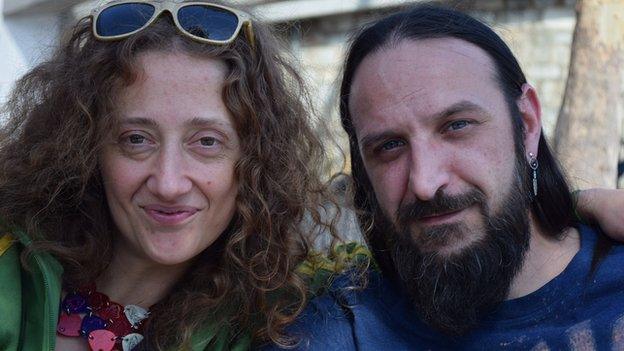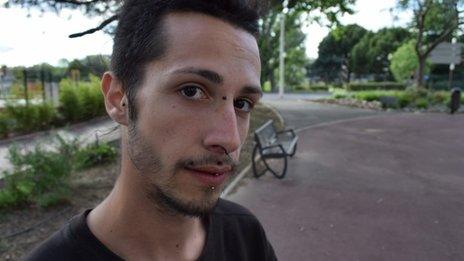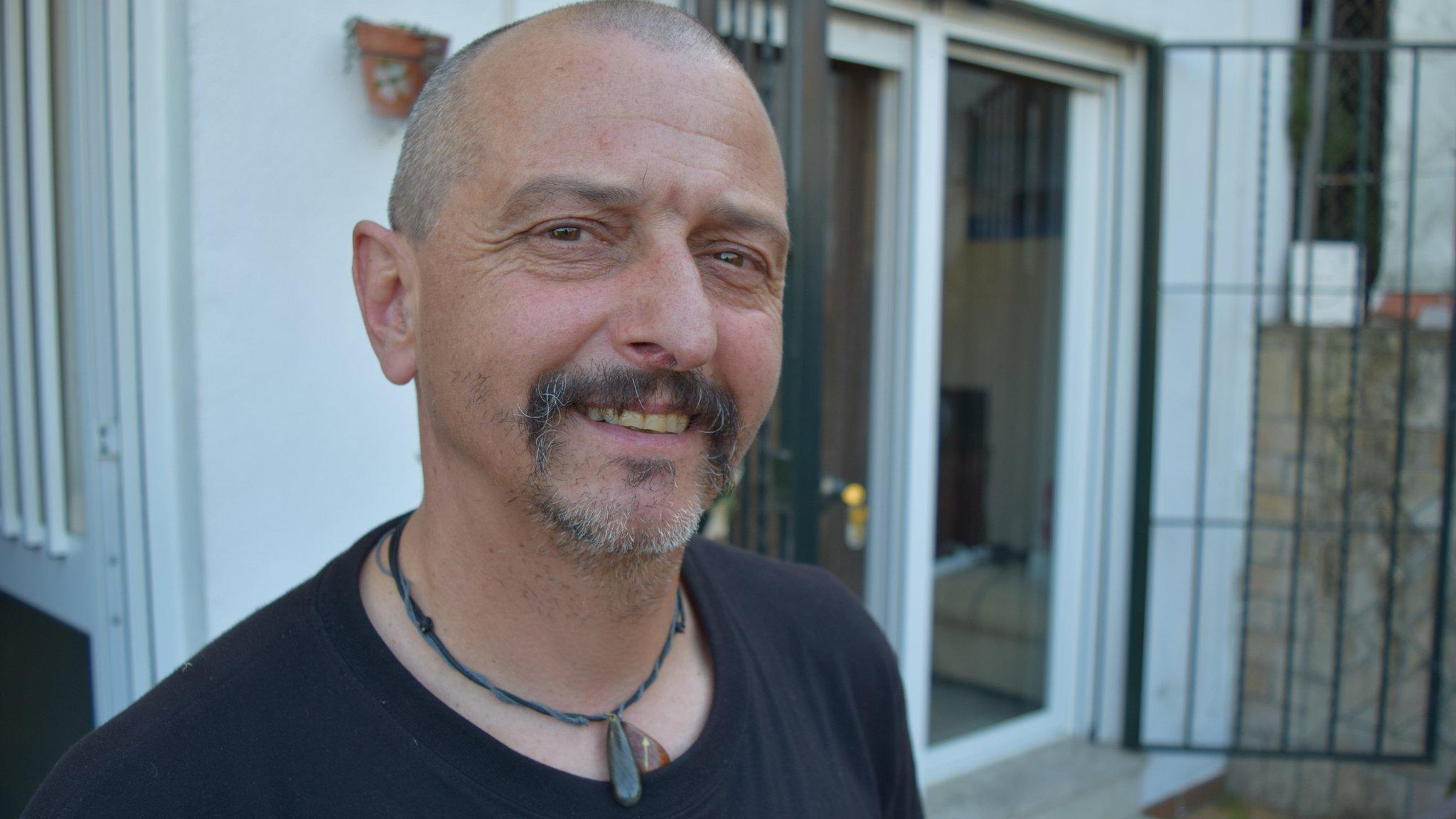European elections: Seeking passion in disenchanted Italy
- Published

Elena Rudatis and Rocco Errario are disillusioned with the political system
Of eight people I asked at random in Milan, none was planning to vote: an unemployed man, an underpaid shop worker, a factory worker, two artists, two university students and an electrical engineer.
So deep goes the disenchantment that even the "protest vote" personified by former comedian Beppe Grillo has lost its appeal.
And if people feel removed from Rome, the disconnect appears just as strong with Brussels, as the unemployment plaguing the south for generations seeps north. Last year the jobless rate for Lombardy rose from 7.5% to 8.1% (in Calabria it was 22%).
Yet it is not from lack of enthusiasm for democracy that people will stay away on 25 May, and the longing for good leaders is strong.
I can only say one thing with certainty - Antonio Gamberi will not be among them, despite the best efforts of his followers in Milan.
Think shrimp
Gamberi the Italian poet died 70 years ago but three 20-something guys are merrily distributing slips of paper bearing his name around Milan.
In fact, legend has it that one of them - Matteo - has spread the Gamberi message and its symbol the shrimp (gamberi means shrimps in Italian), to cities across Italy.
Matteo, the only one of them not from Milan, but Piedmont, does not work because he "wants to stay free", and moves around the country.
What was started by Davide, the factory worker, as an absurdist joke two years ago seems to have taken on a life of its own.
When I meet Matteo, Davide and Federico, a botany student, on Milan's Via Dante, they happily come up with all kinds of explanations.
I like Matteo's best - some people will stop in their tracks and think shrimp, the little creature that swims backwards, and maybe, just maybe, think back on their own self-centred lives and the jam that modern Italy is in.
It is also an anti-political joke, they say.
"I voted at the last election, then spent three days wondering why I bothered," says Federico.
"We can't vote for anybody because they all think of themselves first, not the people," Matteo adds.
Political football
Elena Rudatis, 38, an artist from Rimini living in Milan, voted for Beppe Grillo at the last national election.
She wanted to scare a self-serving political system. But now look, she says, the big parties are in league again.
Her friend Rocco Errario, a 34-year-old artist she teases affectionately for being a "lazy southerner" from Basilicata, likens the parties to football teams, which have their life-long supporters.
"Everybody is right," he notes, smiling. "Nobody is wrong."
Elena would, however, happily vote on an issue that engaged her, such as a referendum on nuclear power.
She appreciates the efforts of younger politicians to generate enthusiasm for Europe, but thinks the vote will change nothing.
"I would like to vote but I just don't know who for," she says.
Southern discomfort
When Paolo (not his real name), 50, was a student at a university in the far south, he would travel home every weekend to his parents in another southern city.
He would be sent back each time with 6,000 lira (three euros; £2.50; $4 in today's money) from his father, and a bottle of homemade tomato sauce, pasta and meat from his mother to feed him through the week. Long, hard study every day because he knew the sacrifices his parents were making.
Now he is a successful electronics engineer heading off on a business trip from his home near Milan, where he has four children, the eldest of whom will be starting university soon.
He has budgeted for the education of all four - currently it would be about 4,000 euros a year each - so they do not have to work excessively while they study. The children will live at home.
But once they finish, they must pay their own way, he says. "This is the culture of the Italian south."
Kids at schools in the rich north, he believes, only think about their future when they are 18 and have to move on.
In the south, he argues, children have a survival instinct that means they think ahead. He remembers making his plans with his friends when he was 16. They also are very successful men today - doctors, lawyers, managers.
What Italy needs, he suggests, is some of that same drive - a charismatic, farsighted figure to kindle a passion for the country again, and for Europe, "which feels too far away".
Like Mussolini? "Certainly not. This is a democracy."
Italy's European election campaign, he observes, is the usual left-right slogging match, with no debate on broader European issues.
"I believe in Italy," the engineer adds, quietly but with feeling.
"I love Italy. But I feel alone."
Italians employed and unemployed alike seem to be switching off from party politics, let alone the European elections.
You can also follow Patrick Jackson's reporting on jobless politics in the southern eurozone on his blog on Tumblr, external or get updates via Twitter, external.
- Published7 May 2014

- Published6 May 2014

- Published3 May 2014

- Published1 May 2014

- Published30 April 2014
